If there was a series of movies called The Fantastic Five, the fifth would be Marcus Ussery, recent graduate of Sam Houston State University (SHSU) and proud Ratio Christi SHSU student leader. What is his super power? Marcus has been a magnet to people of other worldviews since high school.
“God has never failed to surround me with skeptics, atheists, and anti-theists,” Ussery says. “By my sophomore year of college, I became a small group leader in XA (Chi Alpha) campus ministries. Small groups in XA are formed by sharing the Gospel with students around campus and inviting them to join the groups. In the process of building a small group, God often compelled me to reach out to the most heart-hardened of students. I also noticed that these students, mostly atheists and agnostics, were more willing to open up in conversations with me rather than my brethren though at the time I wasn’t much better trained.”
Ussery was recently recognized by SHSU Chapter Director Darren Williams with Ratio Christi’s outstanding student acknowledgment, the Legatus Christi certificate (as seen in photo with Ussery at right).
Dr. Williams (an associate professor of physical chemistry) says, “Marcus exemplifies the four core values of the Legatus Christi program:
1. Academic Rigor – The student is to pursue God with their mind, developing knowledge and wisdom.
2. Integrity – The student demonstrates Christ-like character.
3. Enthusiastic evangelism – The student engages others with compassion and respect.
4. Multiplication – The student is able and willing to teach others who will teach others.
Marcus (now graduated and attending Biola University) was a faithful member of the SHSU Chapter of Ratio Christi for a little over two years. He began attending because he wanted to be able to answer his friends’ questions about God’s existence. He really liked that we began with natural and philosophical arguments because those were more compelling to his friends than Bible verses. As a result of his faithfulness to the organization, he was around to have long conversations with me. Let me address the four core values using information from these conversations:
Academic Rigor – Marcus read through Greg Koukl’s Tactics the first semester he was in RC and immediately began putting it into practice.
Integrity – He displayed a great degree of integrity. During summer orientation tabling, I was able to confidently rely upon him to show up, set up, and greet the freshmen when I was away on vacation. At other times I observed his interactions with new students and found he had a very gentle and disarming demeanor. I do not think he has a rude bone in his body.
Enthusiastic evangelism – This one really triggered my support for him to receive the Legatus Christi designation. SHSU has a vibrant student body that loves to “chew” on big issues. By his last semester (Fall 2014), Marcus was comfortable enough with his apologetics training to approach some students in our campus Latter Day Saints (LDS) student organization to talk with them about theology. The interaction went so well that they met a total of three times – each time bringing higher-level elders into the conversation. Marcus’ goal was to have a cordial discussion and to ’put a stone in their shoe’ (as Greg Koukl says in Tactics). I think he did this well, and the interaction was positive.
This is a touchy subject on campus. Some years ago, some students from another group rudely interrupted the LDS student meeting with shouts and accusations of heresy and other things. Their misguided and offensive approach put a barrier between the LDS students and Christian students to this day. Marcus was able to cross the barrier to have a cordial dialog which established where we disagree on theological matters. This was no small thing.
4. Multiplication – Marcus also took a friend along – Tim Verastegui. He began bringing Tim in the Spring of 2014, and they both met with the LDS students. Marcus “caught the bug” of apologetics, so he finished his criminal justice degree and enrolled in Biola’s online program for Masters in Christian Apologetics. He plans to use this to multiply the ranks of Christian apologists.”
(One of the goals for Legatus Christi recipients is “Exponential Evangelism” – that they should use their apologetics in their witnessing, in evangelism, and also in supporting and building up other students to follow their example).
We caught up with Ussery (after he started at Biola) to tell our readers more about him.
Q. Tell us more about that LDS experience
A. The LDS students I spoke with lived up to their hospitable reputation. They were very inviting and open to most discussion. I ended up using opportunities in their discipleship process to challenge their worldview. We met once a week for a full semester. As Darren said, every chance I had I took my roommate and ministry brother Tim with me for support. The conversations started with what scholastically and historically separates Mormonism from other denominations and Christian groups – the book of Mormon and Mormon history.
I made it a mission to only challenge doctrines they brought up, so we didn’t discuss many of the widely studied heretical teachings. I would voice inconsistencies in Mormon doctrine, and refute doctrines that contradict centuries of the Bible’s preserved history, translation, and hermeneutics. My study of research done by J. Warner Wallace and Greg Koukl was invaluable in these discussions. Even restricted to their most basic teachings about God and the Bible, we had much to discuss and peacefully debate over.
Q. Let’s go back a great deal further than that for a moment…when did you find Christ as your Savior?
A. It was during youth group so, I was about fifteen to sixteen years old. I went to church inconsistently throughout earlier years, but my parents stopped taking me when I was somewhere between seven and ten – I don’t remember. My moral compass (so to speak) developed pretty early so I don’t think they thought I had much to gain from frequent attendance at an early age.
Q. How much did you learn in your youth group about the Christian faith and reasons to believe?
A. I was actually involved in three youth groups and had a leadership role in two. I was in ministry three to five days a week during my junior and senior years. Christian doctrines were never a core focus in high school youth. My pastors and leaders were more concerned with nurturing our connection to the body of Christ and teaching us the spiritual benefits that come from personal devotion and Christian fellowship. My youth pastor did instruct me to memorize the Nicene Creed, but no one ever reviewed the tenants with me back then (the Nicene Creed is the most widely accepted brief statement of the Christian faith in liturgical churches, where it is said every Sunday as part of the Liturgy).
Q. How did you first get interested in apologetics, and how did you get involved with RC?
A. When God began attracting me to witness to atheists and agnostics, I began studying apologetics because I wanted to be a more effective minister to the students God set on my heart. J. Warner Wallace’s Cold Case Christianity was the first apologetics book I ever read cover to cover and it really opened me to further research and my current spiritual aspirations. I’m looking forward to reading his new book God’s Crime Scene this semester. I got involved in RC simply by finding a flyer around campus.
Q. What are the dynamics of this RC chapter?
A. Engaging secular thinkers is amongst the primary goals for the Sam Houston RC chapter. The organization is pretty small, and outsiders usually don’t attend as I did. I hear that before my time the group was large enough for regular weekly discussion groups during the meeting, but in my two years it has been around four to ten students. RC does get involved around campus and table events throughout the year. Other ministries like CRU and Baptist Student Ministry are always eager to hear the apologists who come to campus. I think this RC chapter is positioned as an apologetics resource for other groups and aspiring evangelists (see more photos from the SHSU chapter below).
Q. What would you say has changed in your own faith as a result of learning apologetics?
A. I feel like my faith has become more substantive since I began studying apologetics. It has taught me much more about the scriptures, history, and philosophy. Apologetics has also made my personal devotion more exciting and qualitative. I study more than I read and in the process spend more time with God than in previous years. Jesus is my Lord and my highest professor. Apologetic research has also made me more confident and prepared for evangelical ministry with non-believers.
Even at my current job I’m surrounded by secular minds that throw around the gospel like it’s a fairy-tale. I notice more and more disregard for the implications that follow from insubstantial worldviews. I pray for opportunities and take every chance I can to expose the inadequacies of my coworker’s secular philosophies.
Q. Any other short-term and long-term goals beside the masters in apologetics?
A. I plan to finish the master’s degree, join the Air Force, and continue studying in off time. All the while, staying connected in whatever ministry organization I can find and partner with.
For the long term, I’m open to possibilities. I want to help disseminate apologetics research and training to mission, college, and youth groups. I also want to help nurture the relationships between groups and organizations passionate about apologetics like RC. I plan to never stop learning, and aspire for a PhD in a criminal justice related field. I’m also considering pursuing a PhD in a ministry field, but haven’t committed to this aspiration yet.
Q. What else would you like our readers to know?
A. I want to thank God for loving me and desiring me to understand as much about Him and His world as I can. And I thank Dr. Williams for always encouraging us and providing resources to study for conversations around campus. He is a leader who is always eager to respond when asked for help. RC has been a blessing, and I’m glad to contribute in any way I can.
To my fellow students:
Speak up to your unbelieving friends and family, because you’re going to be the best reference they ever listen too. Sow seeds by bulk whenever possible, and trust God to bring the harvest. Expect the best, and make the most of each conversation.
Ussery is currently supporting himself by working at Lifetime Fitness center and is going to school online.
Posted on Aug 17, 2015by Sheryl Young. Content in blogs does not necessarily represent Ratio Christi’s views.


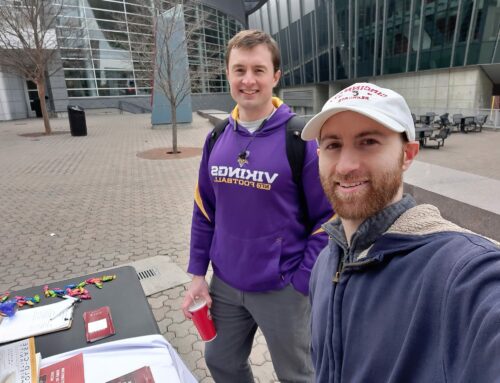
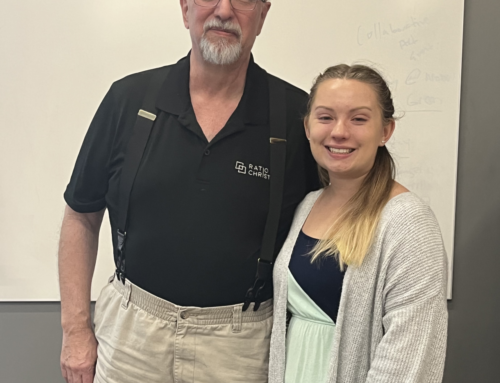
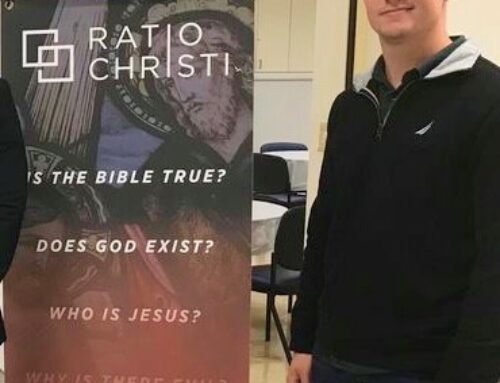
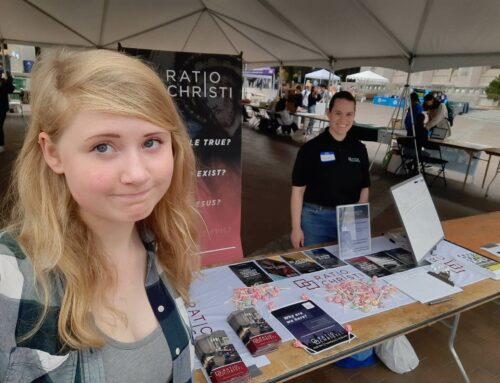

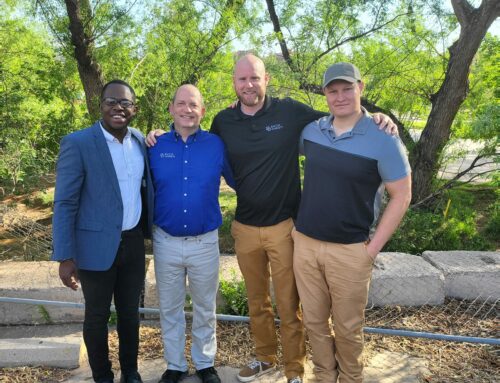
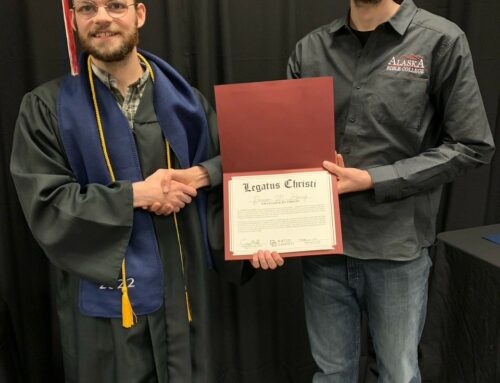

Leave A Comment